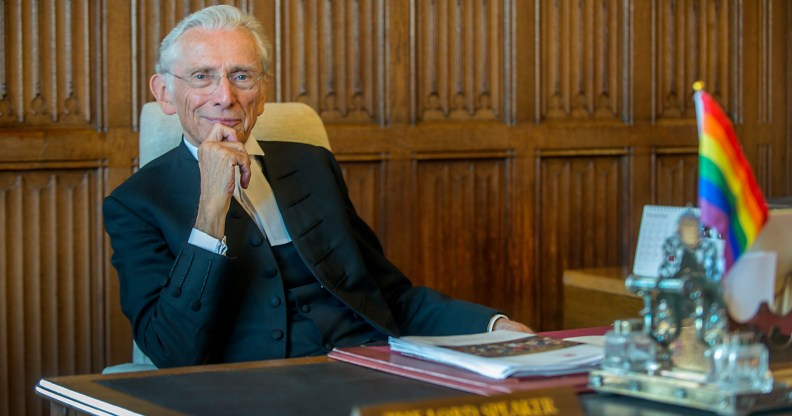Lord Fowler calls for nationwide campaign to counter hate crime

Lord Norman Fowler. (Annabel Moeller)
Looking back to the 1980s it was in many respects – but not all – another world.
Our knowledge was limited; our drugs were non-existent. Contracting HIV was most often a death sentence. It was for reasons like this that we launched the “Don’t Die of Ignorance” campaign in 1986/87.
There may have been little you could do for those who had contracted HIV but what you could do was warn people about the dangers of unprotected sex and the dangers of sharing needles. In that campaign we used all the modern media – television, film, radio and newspapers to get our message across. These were the days before the Internet.
The result was that new diagnoses came down and it was not until 10 years later that they started climbing again.
Of course, in the intervening years we had the discovery of anti-retroviral drugs and we provided clean needles for drug users. Successful as these measures were, the trouble was that many people felt the crisis was over, which evidently it was not.
Globally, today, there are still almost one million deaths a year. Around 38 million people are living with HIV including 100,000 here in Britain. And what is the reason for that?
Inadequate health systems in many countries provides part of the answer (although not here).
Another is the prejudice, discrimination and violence against LGBT+ people which prevents people coming forward for testing or treatment. That prejudice is encouraged in too many countries by laws that make homosexuality a criminal offence.
Prejudice against drug users prevents methadone treatment going to those who need it.
And worst of all is the prejudice in the population generally by communities who simply reject LGBT+ people, and families who turn their backs on their own children.
But, let me be clear, I am not just talking of sub Saharan Africa and other well publicised “hot spots,” I am also talking about Europe and Britain. I give you one measure. Reports during recent weeks have seen in London two women attacked on a bus by four boys aged 14 to 17 and left covered in blood. In Liverpool two men were subjected to a knife attack. In Preston a man was thrown to the ground by a seven-strong gang and then stamped on with the gang calling out “gays should die.”
The figures show the same story. A Stonewall survey showed that one in five LGBT+ people have experienced hate crime in the last 12 months. While the government’s own LGBT+ survey showed that 40% had experienced a negative incident in the 12-month period. Both surveys report that far from over reporting most do not report the incidents to the police.
We are used to pointing at James Anderson, the Chief Constable of Manchester Police, who in 1986 accused those with Aids of “swirling in a cesspit of their own making,” as a historical oddity. In fact, the prejudice which he exhibited is alive and well, and worst of all shared by perpetrators beyond the education system.
We must continue our efforts in schools to combat the prejudice, but we must also mount a much wider campaign. Just as we used the modern media to counter Aids in the 1980s, we should now plan a nationwide campaign to fight back against hate crime.
We have skilled communicators in this country. We should enlist their help and provide the finance that is necessary.
I write these words before the announcement in the press today of £100 million on a public education campaign on Brexit. There is a nice contrast. When I started the ‘Don’t Die of Ignorance’ campaign, the Treasury Minister at the Cabinet Committee, considering the position, said he would only support it provided that the Treasury did not have to provide any new money to finance it. I hope those days have passed. What we now need is a firm financial commitment for public education on public health, to fighting HIV and AIDS, and urgently to counter the rise in hate crimes.

